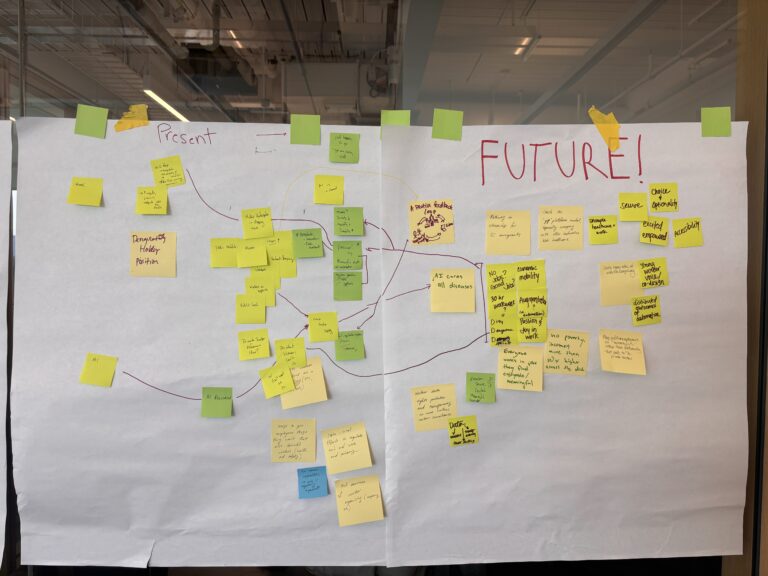Time plays a crucial role when contemplating ways to achieve widespread impact. Nevertheless, perceiving time in a linear fashion alone is insufficient. Three case studies in advanced manufacturing produced by The University of North Carolina at Chapel Hill Department of City and Regional Planning and the Urban Manufacturing Alliance (UMA) elucidate the role that context and circumstances play alongside time to determine the path to scale for various organizations. The case studies were further discussed at A Cycle of Inclusive Innovation: How Technology Adoption in Manufacturing Benefits Workers and Businesses Alike, a webinar hosted by the UMA, UNC DCRP, and RTI. Watch the full webinar here, passcode UMA-UNC682023.
The first case study in the series from Buffalo, New York exemplified the strength of multi-sectoral partnerships in cultivating a robust social infrastructure to attend to workforce development needs in the sector and match that need to local capacity building. The second and third case studies in the series come from Orlando, Florida and Baton Rouge, Louisiana. Each community highlights the power of a context-aware and iterative approach to cross-sector collaboration and offers lessons more broadly on scaling impact. In Orlando, the crisis of a pandemic and its outsized toll on the hospitality industry in the region spurred rapid response while also maintaining a focus on the long-term benefits to workers in order that the community might be more resilient in the face of a future crisis. In Baton Rouge, a retrospective look at the slow but necessary work of trust-building between the petrochemical and oil-refining industries and communities of color in the context of decades of injustice are the foundation toward visioning a better future that rewrites this history to center the community.
The workforce development ecosystems outlined in these case studies shine light on various pathways to and timelines of scale. Scaling impact is a challenge beyond manufacturing, but these case studies offer a test bed to better understand how communities might select viable models to fit the local context and learn from failures. Thus, “the results of our programs could show us how small-scale feedback might catalyze big changes by transforming practices across the system” (Designed for Scale: Growth from the Outset, not as an Afterthought). The case studies are exemplary of how to scale inclusive innovation without losing the importance of context and further, letting context guide the implementation.
All three case studies make evident the importance of context and champion the idea that the efficiencies of repetition through learnings from other contexts are insufficient to attending to the specific situation faced by a community. In the case of Orlando, the pace of a crisis emboldened a rapid response but also illuminated the necessity for resilience for future crisis mitigation. In Baton Rouge, the pace of trust-building required a slow and thoughtful response to the needs of workers and the community at large and highlighted the importance of moving bidirectionally, that is attending to histories of harm and looking forward toward opportunities in the renewable energy future. The Buffalo case study adds another dimension of time to this conversation. While Orlando has a relatively recent history of developing the manufacturing sector, and Baton Rouge has had a strong manufacturing sector for quite a while bolstered by the energy industry, Buffalo’s manufacturing sector virtually disappeared during deindustrialization in the 1970s and 1980s, and is making a comeback through renewed investment now.
Resilient Scale and Responsive Timelines
Responding to a Crisis
Crises complicate approaches to scale, as evidenced by the efforts in Orlando. Timescales are never singular. As Winston Churchill famously said, “Never let a good crisis go to waste.” The Orlando case exemplifies moving at the pace of the COVID-19 crisis to harness the energy and resources available to scale impact while simultaneously thinking at the scale of infrastructure to make sure these transitions are lasting and robust.
While COVID-19 spurred rapid response, it is now being met with the slower relationship-building of continuing support for those hospitality workers who made the shift to advanced manufacturing during the pandemic, as well as maintaining that bridge for future generations of workers as well. The work in Orlando illustrates the ability to downshift gears out from crisis mode into long-term sustainability mode, all the while maintaining a consistent goal of mitigating the harm of a collapsing industry on workers by building a bridge to an industry with better opportunities for growth, stability, and family-supporting wages.
Crisis response functions at a rapid-response pace, and while that pace may be appropriate to some scenarios, it is not appropriate to all. The Baton Rouge case illustrates why speed is not always an ally to scale, and why the ability to think on multiple timescales will create more resilient futures.
The Pace of Trust
Considerations of timescales and pace in such transitions are rarely singular, but necessarily require thinking and action at more than one timescale at once, as we learned in the Baton Rouge case study.
In Baton Rouge, a slower but important crisis looms over the petrochemical and oil-refining industries: the climate crisis. While in the short term getting more of the local community working in the advanced manufacturing industries of the region is a clear benefit to the generation of income communities of color, it deepens a local reliance on an industry that will necessarily need to make large shifts in the coming years to renewable energy sources. The Baton Rouge case illustrates the complexity of weighing the critical needs of the community to gain access to good jobs, family-supporting wages, and opportunities to decrease income inequality. However, without a second tract of work that can usher these workers into a new age of renewables, we will see a repetition of the same workers being left out of opportunities in advanced manufacturing of the future.
The compounding factors of historical divestment, exclusion, and inequities for communities of color show up in each case, and require specific and more complicated forms of trust-building than generic partnerships. However, crises move at a pace all their own, and crisis response and the pace of trust-building are often incommensurate. As the case studies show, the work of building effective, inclusive, and adaptive workforce cannot happen without a network of partners.
There is undoubtedly a need for reparative and historically-informed trust-building we see in Baton Rouge to take place in other communities. This work will look different depending on the context. In Orlando, the injustices faced by hospitality workers, a workforce predominantly made up of women, people of color, speakers of English as a Second Language, and those with less formal education, requires a similarly thoughtful response that, like the work in Baton Rouge, must move at the pace of trust-building. Yet, thoughtfully transitioning these workers into the manufacturing sector can have major impacts on the region’s economy.
The Benefits of Multiple Timescales
Both cases are meant to show that skills from one industry or occupation can be translated to an adjacent one (in the case of petro-chemical and oil-refining to renewable energy) or a completely new sector (as in the case of hospitality workers moving into advanced manufacturing). The Baton Rouge and Orlando case studies show us that it is not enough to work on a single timescale, but that while one may lead, there must also be multiple timescales in consideration – working on coordinated, but distinct tracts. Beyond advanced manufacturing, the cases ask us to consider how to prioritize the need for multi-timescale thinking when it comes to scaling impact. How can a crisis best be harnessed as a spark to ignite a lasting and scalable impact? What could this multi-timescale thinking mean for other industry contexts like tech workers currently experiencing massive layoffs, and care workers who often work in precarious employment conditions?
This research brief was written by Madison Snider, In-House Research Fellow at Siegel Family Endowment





